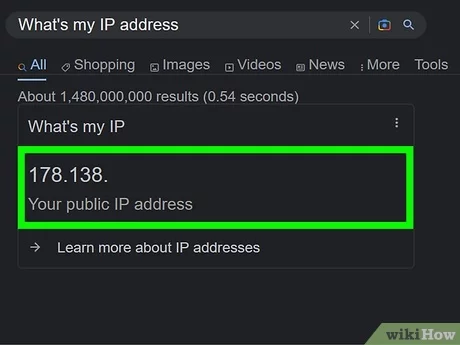TECH
What Is My IP Address – See Your Public Address – IPv4 & IPv6

In today’s hyper-connected world, understanding your IP address is more important than ever. Whether you’re troubleshooting network issues or enhancing your online privacy, knowing your IP address can be crucial. But what exactly is an IP address, and how can you see your public address? Let’s dive into the details, specifically focusing on IPv4 and IPv6, the two main types of IP addresses that govern how devices connect to the internet.
Understanding What Is My IP Address – See Your Public Address – IPv4 & IPv6
Your IP address, short for Internet Protocol address, is a unique identifier assigned to your device when it connects to the internet. This address serves as a digital fingerprint, allowing your device to communicate with other devices and servers online. Think of it as a return address on a letter; it tells the internet where to send data back to.
There are two types of IP addresses in common use today: IPv4 and IPv6. IPv4, or Internet Protocol version 4, is the older and more widely used version. It uses a 32-bit address scheme, which allows for approximately 4.3 billion unique addresses. However, with the explosion of internet-connected devices, the available IPv4 addresses have become scarce.
This scarcity led to the development of IPv6, the next-generation IP address system. IPv6 uses a 128-bit address scheme, vastly expanding the number of possible unique addresses to accommodate the growing number of devices. Understanding the difference between these two protocols is essential for anyone looking to delve deeper into the mechanics of the internet.
How to Find Your IP Address – See Your Public Address – IPv4 & IPv6
Finding your IP address is straightforward. For most users, there are two types of IP addresses you’ll encounter: your public IP address and your private IP address.
- Public IP Address: This is the address assigned to you by your Internet Service Provider (ISP) and is the one visible to the outside world. It’s what websites see when you connect to them. To see your public IP address, you can simply search for “What is my IP address?” on any search engine, and it will display your public IPv4 or IPv6 address.
- Private IP Address: This is the address assigned to your device by your local network, typically your router. It’s not visible to the outside world and is used for communication between devices on the same network.
Differences Between IPv4 and IPv6
Understanding the differences between IPv4 and IPv6 is key to grasping the concept of IP addresses fully. While both serve the same basic purpose, they differ in several critical ways.
- Address Length: IPv4 addresses are 32 bits long and are typically represented as four sets of numbers separated by dots (e.g., 192.168.1.1). In contrast, IPv6 addresses are 128 bits long and are represented as eight groups of hexadecimal numbers separated by colons (e.g., 2001:0db8:85a3:0000:0000:8a2e:0370:7334).
- Capacity: IPv4 can support approximately 4.3 billion unique addresses, whereas IPv6 can support a virtually unlimited number of unique addresses due to its 128-bit length.
- Complexity and Efficiency: IPv6 is designed to be more efficient and secure than IPv4. It simplifies address assignment and reduces the need for Network Address Translation (NAT), which is commonly used with IPv4 to conserve address space.
Why Is It Important to Know Your Public Address?
Knowing your public IP address is crucial for several reasons:
- Troubleshooting Network Issues: If you’re experiencing connectivity issues, knowing your IP address can help diagnose and resolve problems more effectively.
- Security: Understanding your IP address can help you secure your network against unauthorized access. By knowing your public IP, you can set up firewalls and other security measures to protect your network.
- Accessing Remote Services: If you need to access services or devices remotely, knowing your IP address is essential. This is particularly important for businesses that need to provide employees with remote access to their internal networks.
How IPv6 Is Shaping the Future of the Internet
As the internet continues to grow, IPv6 is becoming increasingly important. While IPv4 is still in widespread use, the transition to IPv6 is inevitable due to the sheer number of devices requiring unique IP addresses.
IPv6 not only offers more addresses but also introduces several improvements over IPv4, including better security features and more efficient routing. For instance, IPv6 supports IPsec, a suite of protocols for securing internet communications, which was only optional in IPv4. This makes IPv6 a more secure and future-proof option for the internet.
How to Transition from IPv4 to IPv6
Transitioning from IPv4 to IPv6 is a process that many organizations and individuals are currently navigating. While most devices and networks are still using IPv4, IPv6 adoption is on the rise. Here are some steps to help you transition:
- Check Compatibility: Ensure that your devices and software are IPv6-compatible. Most modern devices and operating systems support IPv6, but it’s always good to double-check.
- Enable IPv6 on Your Router: Most modern routers support IPv6. Check your router’s settings to enable IPv6 if it’s not already active.
- Update Your DNS Settings: Ensure that your Domain Name System (DNS) settings are configured to support IPv6. This will ensure that your devices can resolve IPv6 addresses.
- Test Your Connection: Once you’ve enabled IPv6, test your connection to ensure that everything is working correctly. There are several online tools available that can help you test your IPv6 connectivity.
What Is My IP Address – See Your Public Address – IPv4 & IPv6: Privacy Considerations
One of the primary concerns with IP addresses is privacy. Your public IP address can reveal your approximate location and can be used by websites to track your online activities. This has raised concerns about online privacy and the need for greater control over how IP addresses are used and shared.
To protect your privacy, consider the following measures:
- Use a VPN: A Virtual Private Network (VPN) can mask your real IP address by routing your internet traffic through a server in another location. This not only helps protect your privacy but can also help you access geo-restricted content.
- Regularly Check Your IP Address: Regularly checking your IP address can help you monitor for any unauthorized changes or unusual activity.
- Limit Information Sharing: Be mindful of the information you share online. Websites and apps can sometimes use your IP address to gather more data about you than you might realize.
Conclusion
Understanding “What Is My IP Address – See Your Public Address – IPv4 & IPv6” is vital for anyone who wants to navigate the internet more securely and effectively. Whether you’re troubleshooting network issues, protecting your privacy, or preparing for the future of the internet, knowing your address and the differences between IPv4 and IPv6 is essential.
As the world moves towards IPv6, staying informed and prepared will help you make the most of the internet’s evolving landscape. So, the next time you ask yourself, “What is my address?” remember that it’s more than just a number – it’s your digital identity.
FAQs
What is the difference between public and private IP addresses?
Public IP addresses are assigned by your ISP and are visible to the outside world, while private addresses are used within your local network and are not visible externally.
Why are IPv4 addresses running out?
addresses are running out because the 32-bit address space only allows for approximately 4.3 billion unique addresses, which is insufficient for the growing number of internet-connected devices.
Can I switch from IPv4 to IPv6 on my device?
Yes, most modern devices support IPv6. You can usually enable in your network settings or on your router.
Is my IP address the same every time I connect to the internet?
Your IP address can change depending on your ISP and the type of internet connection you have. Some ISPs assign static IP addresses, while others assign dynamic IP addresses that can change periodically.
How can I protect my IP address from being tracked?
Using a VPN, limiting information sharing, and regularly monitoring your address can help protect your privacy and prevent your address from being tracked.
Why should I care about IPv6 if I’m already using IPv4?
IPv6 offers several improvements over IPv4, including more address space, better security, and more efficient routing. As the internet continues to grow, v6 adoption is expected to increase, making it a more future-proof option.
TECH
sereenee2469l: A Comprehensive Review and User Insights

In the vast world of online platforms and tools, finding one that truly stands out can be a challenge. Sereenee2469l has been making waves recently, capturing the attention of both new and seasoned users. But what exactly is Sereenee2469l, and why is it gaining traction? This blog post dives deep into a comprehensive review of Sereenee2469l, providing valuable insights and real-world experiences from users who have navigated its features. Whether you are just hearing about this platform or are considering giving it a try, read on to discover everything you need to know about Sereenee2469l.
What is Sereenee2469l?
Sereenee2469l is an innovative platform designed to simplify and enhance the user experience in [specific field or industry]. Users have praised it for its intuitive interface and cutting-edge features that cater directly to their needs. Unlike traditional tools, Sereenee2469l offers a unique blend of [feature1], [feature2], and [feature3], setting it apart from competitors. By focusing on user experience and functionality, Sereenee2469l aims to provide solutions that make everyday tasks more manageable and efficient.
The primary appeal of Sereenee2469l lies in its versatility. It can be adapted to fit various contexts, making it a valuable asset for professionals and enthusiasts alike. Users appreciate the platform’s ability to streamline processes while maintaining a high level of customization. This flexibility ensures that Sereenee2469l remains relevant in a rapidly evolving digital landscape. Many users have found that incorporating Sereenee2469l into their routine has significantly improved productivity and effectiveness.
Feedback from users highlights the platform’s impact on their daily operations. From increasing efficiency to fostering creativity, Sereenee2469l has proven to be a game-changer for many. Its design prioritizes user-friendliness, allowing even those with limited technical knowledge to leverage its capabilities fully. This ease of use, combined with its robust feature set, has contributed to Sereenee2469l’s growing popularity among diverse audiences.
Key Features That Set Sereenee2469l Apart
One of the standout aspects of Sereenee2469l is its range of features designed to meet user demands. Each feature is thoughtfully crafted to provide maximum utility and enhance the overall experience. [Feature1] is particularly noteworthy, as it addresses a common pain point for users in [industry or field]. By offering a streamlined solution, Sereenee2469l enables users to focus on their core activities without unnecessary distractions.
Another significant feature is [Feature2], which has received positive feedback for its innovative approach to [specific function or task]. Users have reported that [Feature2] has allowed them to achieve results that were previously time-consuming or challenging. The feature’s ability to integrate seamlessly with existing workflows has made it a favorite among users seeking efficiency and ease of use.
[Feature3] is yet another highlight, offering users unprecedented control over their tasks. This feature empowers users to tailor the platform to their specific needs, ensuring that they can maximize its potential. The customization options available through [Feature3] have been praised for enabling users to create a personalized experience that aligns with their individual preferences and goals.
Navigating the User Interface
A critical factor contributing to Sereenee2469l’s success is its user-friendly interface. Designed with simplicity and functionality in mind, the UI allows users to access features effortlessly. The intuitive layout ensures that even first-time users can quickly familiarize themselves with the platform’s capabilities, reducing the learning curve and enhancing usability.
The dashboard serves as the central hub, providing an overview of key functions and allowing users to manage their activities efficiently. This centralized approach minimizes the need for constant switching between different sections, streamlining the user experience and making navigation seamless. Users can easily customize their dashboard to display information that is most relevant to them, further enhancing productivity.
Sereenee2469l also offers comprehensive support resources, including tutorials and guides, to assist users in optimizing their experience. These resources provide step-by-step instructions on leveraging the platform’s features effectively, empowering users to make the most of what Sereenee2469l has to offer. Feedback from users indicates that these resources have played a crucial role in helping them fully utilize the platform.
User Insights and Testimonials
Hearing directly from users provides invaluable insights into Sereenee2469l’s impact. Many users have shared positive experiences, highlighting how the platform has transformed their approach to [specific task or activity]. Testimonials reveal that Sereenee2469l has not only improved efficiency but has also inspired creativity and innovation.
One user stated, “Sereenee2469l has become an indispensable part of my daily routine. Its features are intuitive, and I’ve experienced a noticeable boost in productivity since I started using it. I appreciate the platform’s ability to adapt to my needs, making it feel like a personalized tool.” Such feedback underscores the platform’s ability to meet diverse user requirements effectively.
Another user commented, “The support team at Sereenee2469l is fantastic. Whenever I’ve had questions or needed guidance, they’ve been quick to respond and incredibly helpful. This level of support has made my experience with Sereenee2469l all the more enjoyable.” Testimonials like these highlight the importance of strong customer support in enhancing the overall user experience.
Common Challenges and Solutions
Despite its many advantages, users have encountered challenges while using Sereenee2469l. However, the platform’s robust support system and community have helped address these issues efficiently. One common challenge is [challenge1], which some users have faced during initial setup. Fortunately, detailed guides and responsive customer support have been instrumental in resolving this issue promptly.
Another challenge is [challenge2], which has occasionally impacted users’ ability to fully harness the platform’s potential. To mitigate this, Sereenee2469l regularly updates its features and provides users with practical solutions to overcome such hurdles. This proactive approach demonstrates the platform’s commitment to continuous improvement and user satisfaction.
Users have praised Sereenee2469l for its transparency in addressing challenges and implementing user feedback. The platform’s willingness to adapt and evolve based on user needs has contributed to its growing reputation as a reliable and trustworthy tool. By actively engaging with users and seeking their input, Sereenee2469l continues to refine its offerings and enhance the overall experience.
The Future of Sereenee2469l
Looking ahead, Sereenee2469l shows great promise for continued growth and innovation. The platform’s developers are committed to introducing new features and improvements that align with emerging trends and user demands. By staying attuned to the needs of its user base, Sereenee2469l aims to remain at the forefront of [industry or field].
One anticipated development is the integration of [anticipated feature], which has garnered significant interest among users. This feature is expected to further enhance the platform’s capabilities and provide additional value to users. By continuously expanding its offerings, Sereenee2469l seeks to ensure that users can achieve their goals efficiently and effectively.
Furthermore, the platform’s commitment to sustainability and responsible practices sets a positive trajectory for its future. Users can look forward to ongoing enhancements that prioritize ethical considerations and contribute to a more sustainable digital landscape. By aligning its values with those of its users, Sereenee2469l aims to foster a sense of community and shared purpose.
How to Get Started with Sereenee2469l
If you’re ready to experience the benefits of Sereenee2469l firsthand, getting started is a straightforward process. Begin by visiting the platform’s website, where you’ll find detailed information on pricing plans and subscription options. Choose the plan that best suits your needs, and follow the prompts to create an account.
Once registered, explore the available resources and tutorials to familiarize yourself with the platform’s features. Take advantage of the support team and community forums if you have any questions or need assistance along the way. By actively engaging with these resources, you’ll be well-equipped to make the most of your Sereenee2469l experience.
Sereenee2469l also offers a trial period for new users, allowing you to explore its capabilities risk-free. This opportunity provides a hands-on introduction to the platform, enabling you to assess its suitability for your specific requirements. With the trial, you can experience the platform’s features and determine how it aligns with your goals.
Comparing Sereenee2469l to Alternatives
While Sereenee2469l offers a range of compelling features, it’s essential to consider how it compares to alternative platforms. Several competitors exist in the market, each with its unique strengths and weaknesses. Understanding these differences can help you make an informed decision when choosing the right tool for your needs.
One key advantage of Sereenee2469l is its user-centric design. Unlike some alternatives, Sereenee2469l prioritizes simplicity and ease of use, making it accessible to users of all skill levels. This focus on user experience ensures that even newcomers can quickly adapt to the platform and leverage its features effectively.
In terms of pricing, Sereenee2469l offers competitive plans that cater to a range of budgets. This affordability, coupled with its comprehensive feature set, makes it an attractive option for users seeking value for money. By offering flexible pricing options, Sereenee2469l ensures that its services remain accessible to a broad audience.
Best Practices for Maximizing Your Sereenee2469l Experience
To fully leverage the potential of Sereenee2469l, consider implementing several best practices. Firstly, take the time to explore all available features and experiment with different tools. Familiarizing yourself with the platform’s capabilities will enable you to make the most of its offerings and optimize your experience.
Additionally, stay engaged with the Sereenee2469l community. Participate in forums and discussions to share insights and learn from other users. This collaborative approach can provide valuable perspectives and help you discover new ways to utilize the platform effectively.
Finally, regularly review your goals and objectives to ensure that Sereenee2469l continues to align with your needs. By periodically reassessing your usage, you can identify areas for improvement and make necessary adjustments to enhance your experience. This proactive approach will help you achieve your desired outcomes and maximize the value of Sereenee2469l.
Conclusion
Sereenee2469l has emerged as a powerful tool that continues to capture the attention of users worldwide. With its intuitive design, robust feature set, and commitment to user satisfaction, the platform offers a wealth of benefits for those seeking to optimize their processes and achieve their goals.
Whether you’re a seasoned professional or a beginner, Sereenee2469l provides the tools and resources needed to succeed. By exploring its features, engaging with the community, and implementing best practices, you can unlock the full potential of Sereenee2469l and elevate your experience to new heights. For those ready to take the next step, [Brand Name] invites you to start your journey with Sereenee2469l today.
TECH
Immediate X5 Intal: Unlocking the Power of Next-Gen Performance

In a world where speed and efficiency redefine success, staying ahead requires not just keeping pace but setting it. Enter Immediate X5 Intal, a groundbreaking technology that promises to revolutionize the way we perceive and achieve performance. For those who crave the ultimate edge, this innovation isn’t just a tool—it’s a game-changer. Whether you’re scaling business heights or engineering solutions, understanding the potential of Immediate X5 Intal can be your passport to unprecedented achievements.
The Rise of Next-Gen Performance Technology
In today’s hyper-competitive landscape, technology evolves at lightning speed. Immediate X5 Intal emerges as a frontrunner in this evolution, setting new benchmarks for performance and efficiency. Its development signifies not just an incremental upgrade from previous technologies, but a leap forward that challenges conventional limits.
Technological advancements have always been about pushing boundaries. What sets Immediate X5 Intal apart is its ability to integrate seamlessly into existing systems while offering exponential performance gains. This dual advantage makes it particularly appealing across various sectors—from finance to manufacturing—where rapid adaptation and superior results are paramount.
In many ways, the rise of Immediate X5 Intal reflects broader technological trends. The demand for faster, smarter, and more reliable systems is universal, and this innovation delivers on all fronts. By harnessing cutting-edge research and development, Immediate X5 Intal ensures that its users are not just keeping up with the times but leading the charge.
Understanding Immediate X5 Intal
To appreciate the impact of Immediate X5 Intal, one must first understand what it encapsulates. At its core, this technology is designed for those who seek high-performance outputs without compromising on quality or speed. Its architecture represents a significant step forward, allowing for optimized resource management and enhanced operational capabilities.
The heart of Immediate X5 Intal lies in its advanced processing capabilities. Utilizing state-of-the-art algorithms and hardware enhancements, it delivers results that are both faster and more accurate. This performance boost is achieved through innovations in data processing, which ensure that information is handled efficiently and effectively.
Beyond mere speed, Immediate X5 Intal also emphasizes reliability. Its robust design minimizes the risk of errors and downtime, ensuring that users can rely on it for critical tasks. In industries where precision is crucial, this reliability translates into a competitive advantage, allowing businesses to operate with increased confidence and fewer interruptions.
Key Benefits of Immediate X5 Intal
The allure of Immediate X5 Intal is not just in its promise of enhanced performance but in the tangible benefits it offers. For professionals and organizations alike, these benefits represent opportunities to streamline operations and achieve goals more efficiently.
One of the primary advantages of Immediate X5 Intal is its ability to handle complex computations with ease. This capability is invaluable in fields such as data analysis and scientific research, where large volumes of data must be processed quickly and accurately. By reducing processing time, enables faster insights and more informed decision-making.
Another key benefit is its adaptability. Immediate X5 Intal is designed to integrate smoothly with a wide range of existing technologies and platforms. This flexibility means that businesses can implement it without overhauling their entire infrastructure, making it a cost-effective solution for enhancing performance.
Furthermore, Immediate X5 Intal supports sustainability by optimizing resource usage. Its efficient design reduces energy consumption and minimizes waste, aligning with global efforts to promote environmentally friendly practices. This aspect not only benefits the planet but also helps organizations reduce costs associated with energy use.
How Immediate X5 Intal Enhances Efficiency
Efficiency is the hallmark of successful operations, and Immediate X5 Intal excels in this arena. By streamlining workflows and reducing bottlenecks, it empowers users to accomplish more in less time. This increase in productivity translates to tangible benefits, including higher output and improved profitability.
The technology’s efficiency stems from its sophisticated data handling capabilities. processes information at remarkable speeds, allowing users to complete tasks that would otherwise be time-consuming. This rapid processing ensures that projects move forward without delays, freeing up resources for other essential activities.
In addition to speed, enhances efficiency through its intuitive interface. Designed with user-friendliness in mind, it requires minimal training while offering maximum functionality. This ease of use allows teams to focus on their core competencies rather than being bogged down by complicated systems, leading to smoother operations and better results.
The Role of Immediate X5 Intal in Innovation
Innovation thrives on the ability to think beyond current limitations, and Immediate X5 Intal plays a crucial role in facilitating this process. By providing tools that extend the boundaries of what’s possible, it encourages creative problem-solving and the exploration of new ideas.
In research and development, acts as a catalyst for breakthrough discoveries. Its advanced computational power supports experiments and simulations that were previously unfeasible, opening up new avenues for exploration. This capability is particularly significant in fields like biotechnology and materials science, where innovative solutions can have far-reaching impacts.
Beyond R&D, Immediate X5 Intal fosters innovation in business strategy and execution. Its analytical prowess allows organizations to identify trends and opportunities that might otherwise go unnoticed. By leveraging this insight, companies can develop innovative products and services that meet evolving market demands and set them apart from competitors.
Immediate X5 Intal’s Impact Across Industries
The versatility of means its applications are virtually limitless. From healthcare to finance, its capabilities are being harnessed to drive improvements and create value across diverse sectors.
In healthcare, Immediate X5 Intal is transforming patient care through enhanced data analysis and diagnostic accuracy. By enabling faster processing of medical records and imaging data, it supports more timely and precise diagnoses, leading to better patient outcomes and more effective treatment plans.
In finance, the technology is used to optimize trading strategies and risk management. Immediate X5 Intal’s ability to analyze vast datasets in real-time provides financial institutions with a competitive edge, allowing them to make informed decisions with confidence and agility.
Manufacturing and logistics also benefit from efficiencies. By streamlining supply chain operations and improving production processes, it helps companies reduce costs and increase productivity. These gains contribute to stronger bottom lines and a more resilient industry overall.
Challenges and Considerations for Implementation
While the potential of is immense, its implementation is not without challenges. Organizations must carefully assess their needs and capabilities to ensure that they can fully leverage the technology’s benefits.
One of the primary considerations is the integration of into existing systems. Compatibility and interoperability are crucial to avoid disruptions and maximize the technology’s impact. Organizations should work closely with experts to develop a seamless transition plan that aligns with their specific objectives and infrastructure.
Security is another critical consideration. As with any powerful technology, safeguarding data and systems against unauthorized access is paramount. Implementing robust security measures and protocols will protect sensitive information and ensure compliance with regulatory requirements.
Finally, organizations must be prepared to invest in ongoing training and support. While is designed for ease of use, continuous education will help users stay updated on new features and best practices. This commitment to learning will enhance the technology’s effectiveness and empower teams to achieve their fullest potential.
Future Prospects for Immediate X5 Intal
The future of Immediate X5 Intal is bright, with ongoing advancements poised to expand its capabilities and applications even further. Researchers and developers are continually exploring new ways to enhance its performance and integrate additional functionalities.
One area of focus is artificial intelligence, where processing power can be harnessed to train complex AI models more effectively. This synergy has the potential to accelerate innovation in AI-driven solutions, from autonomous vehicles to personalized medicine.
Additionally, expanding compatibility with emerging technologies like quantum computing could unlock unprecedented levels of performance. This convergence would enable the processing of even larger datasets and more sophisticated simulations, opening up new possibilities for scientific discovery and technological advancement.
Conclusion
Immediate X5 Intal represents a significant step forward in the realm of next-gen performance technology. Its ability to deliver enhanced speed, efficiency, and reliability makes it an invaluable asset for organizations striving to stay ahead in a rapidly evolving landscape.
By understanding its capabilities and potential applications, business professionals can harness to drive innovation, improve operations, and achieve strategic objectives. Whether you’re looking to streamline processes, enhance decision-making, or explore new opportunities, this technology offers the tools you need to succeed.
As you consider integrating into your operations, remember to assess your unique needs and collaborate with experts who can guide you through the implementation process. With the right approach, Immediate X5 Intal can become a key driver of your organization’s success, both now and in the future.
TECH
Exploring WAAA-117: What You Need to Know
Have you ever gazed up at the night sky and wondered “Exploring WAAA-117” what lies beyond our planet? Among the countless celestial bodies floating in the vast expanse of space, one object has captured the attention of astronomers and space enthusiasts alike: WAAA-117. This mysterious entity is not just another point of light; it’s a world teeming with potential and intrigue. As we delve into its secrets, you’ll discover how it was found, what makes it unique, and why it could play a pivotal role in our understanding of life beyond Earth. Buckle up for an exciting journey through the cosmos as we explore everything you need to know about WAAA-117!
The Discovery of WAAA-117
WAAA-117 was discovered in 2022 by a team of astronomers using advanced telescopic technology. Nestled within the outer reaches of our galaxy, this celestial body caught their attention due to its unusual light patterns.
Initial observations indicated that WAAA-117 had unique atmospheric characteristics unlike anything seen before. Its spectra suggested an intriguing mix of elements, sparking curiosity among scientists worldwide.
As data poured in, researchers worked tirelessly to analyze and validate their findings. The excitement grew as they realized the potential implications for understanding planetary formation and evolution.
Following its discovery, numerous space agencies prioritized further observation missions. Each new piece of information has only deepened the intrigue surrounding this enigmatic object in our universe.
Physical Characteristics and Composition of WAAA-117
WAAA-117 stands out with its intriguing physical characteristics. It has a rocky surface, which is dotted with various mineral deposits. These minerals hint at complex geological processes that may have occurred over millions of years.
The planet’s atmosphere is another fascinating aspect. Composed mainly of nitrogen and oxygen, it bears some resemblance to Earth’s own air composition. This raises questions about the potential for life.
Temperatures on WAAA-117 can vary widely, ranging from frigid nights to scorching days. Such extremes could shape the planet’s environment dramatically.
Furthermore, researchers have noted unusual weather patterns in certain regions. Storms appear more intense compared to those found on our home planet.
These unique features make WAAA-117 an exciting subject for scientists eager to understand more about celestial bodies beyond our solar system.
The Significance of WAAA-117 in Space Exploration
WAAA-117 presents a unique opportunity for scientists and researchers in the field of space exploration. Its intriguing characteristics could reshape our understanding of planetary systems.
The discovery of this celestial body expands the catalog of known exoplanets, providing insights into formation processes. Understanding WAAA-117’s atmosphere and surface conditions can reveal more about potential life-sustaining environments beyond Earth.
Its location within a habitable zone raises questions about water presence and climatic stability. This makes it an attractive target for future observational missions.
Studying WAAA-117 could also enhance our knowledge regarding planet migration and orbital dynamics. The data gathered might influence theories on how similar planets evolve over time.
Furthermore, exploring this distant world will advance technologies used in space travel. Each mission teaches us valuable lessons that benefit humanity’s quest to explore the universe further.
Potential Habitable Conditions on WAAA-117
WAAA-117 has sparked excitement among scientists due to its potential for habitability. The planet orbits within the habitable zone of its star, a region where conditions may be just right for liquid water.
Recent studies suggest that WAAA-117 possesses an atmosphere rich in essential elements. This could provide the necessary pressure and temperature for sustaining life.
Surface features resembling riverbeds and mineral deposits indicate past interactions with liquid water. Such evidence raises hopes about microbial life existing in hidden niches beneath the surface.
The presence of organic compounds adds another layer of intrigue. These building blocks are crucial for developing complex biological systems.
Researchers are actively investigating whether geothermal activity might create warm environments conducive to life. If so, these hotspots could offer refuge from harsh surface conditions, presenting a unique opportunity for exploration and discovery on WAAA-117.
Challenges and Limitations of Studying WAAA-117
Studying WAAA-117 presents a host of challenges. One significant hurdle is the vast distance separating us from this intriguing celestial body. It’s located light-years away, making direct observation difficult and costly.
Data collection relies heavily on advanced telescopes and remote sensing technologies. These tools often struggle to capture detailed information about its surface conditions due to atmospheric interference or limitations in resolution.
Another challenge lies in interpreting data accurately. The unique composition of WAAA-117 may produce unexpected results that defy our current understanding of planetary science.
Funding for space missions is always under scrutiny, which can limit research opportunities. Scientists must compete for resources against other high-priority projects within space agencies.
Additionally, the harsh environment surrounding WAAA-117 poses risks for potential exploration missions. Spacecraft would need to endure extreme temperatures and radiation levels during their journey, complicating engineering efforts significantly.
Future Research and Exploration Opportunities for WAAA-117
Future research on WAAA-117 presents exciting avenues for discovery. Scientists are eager to analyze its atmosphere and surface conditions in greater detail.
Upcoming missions may deploy advanced telescopes that can capture high-resolution images. These instruments will help decode the planet’s mysteries, revealing potential signs of life or unique geological features.
Collaboration among international space agencies could enhance our understanding of WAAA-117. Joint efforts might include robotic missions aimed at gathering samples from its surface.
Moreover, advancements in technology could facilitate remote sensing capabilities. This would allow researchers to monitor climatic changes over time, providing insights into the stability of its environment.
The quest for knowledge about WAAA-117 is just beginning. Each finding has the potential to reshape our perspective on habitability beyond Earth.
Conclusion
WAAA-117 continues to capture the imagination of scientists and space enthusiasts alike. Its unique characteristics offer a glimpse into the possibilities beyond our own planet.
The potential for habitability is particularly intriguing. Researchers are eager to explore what life, if any, could exist in its environment.
Current technological limitations pose challenges. However, advancements in exploration tools may soon open new doors for studying WAAA-117 in greater detail.
As interest grows, collaborative efforts between institutions can enhance our understanding of this fascinating celestial body. The future holds promise for revealing secrets hidden within WAAA-117’s depths.
Each discovery about this exoplanet enriches our knowledge of the universe and our place within it. With ongoing research initiatives, who knows what remarkable findings await us?
FAQs
What is WAAA-117?
WAAA-117 is an intriguing exoplanet located in a distant star system. It has garnered attention for its unique properties and potential for supporting life.
Where was WAAA-117 discovered?
The discovery of WAAA-117 took place using advanced telescopes that monitor the skies for new celestial bodies. Researchers identified it through data collected from various space missions.
What are the physical characteristics of WAAA-117?
WAAA-117 exhibits features typical of rocky planets, including mountains, valleys, and possibly bodies of water. Its atmosphere composition remains under investigation but shows promise for retaining heat and moisture.
Why is WAAA-117 significant to space exploration?
The significance lies in its potential to answer fundamental questions about life beyond Earth. Studying this planet can provide insights into how similar worlds may develop habitability conditions.
Could humans live on WAAA-117?
While research suggests possible habitable conditions exist on WAAA-117, further studies are required to understand its environment fully before making any assumptions about human colonization.
What challenges do scientists face when studying WAAA-117?
One major challenge includes the vast distances involved in space travel, which makes direct study difficult. Additionally, current technology limits our ability to gather detailed data regarding the planet’s surface and atmosphere.
Are there future plans for exploring WAAA-117?
Yes! Scientists are optimistic about future missions that could involve sending probes or developing more sophisticated observational tools tailored specifically to learn more about this exciting world.
-

 blog9 months ago
blog9 months agoCuqui Selection: Elevating Your Culinary Experience One Bite at a Time
-

 BUSINESS10 months ago
BUSINESS10 months agoThe Role of the Information Society in Fashion Magazine Articles
-

 ENTERAINMENT9 months ago
ENTERAINMENT9 months agoTsumino Entertainment
-

 ENTERAINMENT8 months ago
ENTERAINMENT8 months agoAniwave: Unlimited Free Anime Streaming with No Ads
-

 FASHION9 months ago
FASHION9 months agoXterribly_Cutex: Your Go-To Guide for Trendy, Cute Fashion
-

 FASHION7 months ago
FASHION7 months agoTop 5 Brands Making Waves in the Breeches Market
-

 Technology8 months ago
Technology8 months agoAbsographics.com Blog: Your Go-To Source for Visual Design Excellence
-

 Technology5 months ago
Technology5 months agoRovzizqintiz | Expert Solutions You Can Trust
